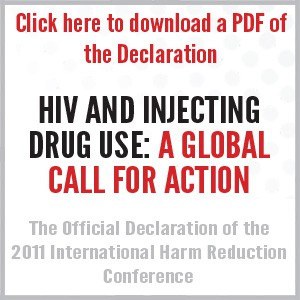
HIV and Injecting Drug Use: A Global Call for Action
Of the 33.3 million people living with HIV globally, an estimated three million are people who inject drugs.They account for 30% of HIV infections outside of sub-Saharan Africa, and up to 80% of infections in Eastern Europe and Central Asia.
The 2001 UNGASS Declaration of Commitment and the 2006 Political Declaration on HIV/AIDS established time-bound targets to be met and reported on by countries worldwide. The commitments aimed to address the needs of people who inject drugs, their families and the communities in which they live through an “urgent, coordinated and sustained response.” These commitments remain unfulfilled. People who inject drugs are increasing as a percentage of global HIV infections with devastating consequences for individuals and communities.
The mobilisation of an “intensified, much more urgent and comprehensive response" to HIV for people who inject drugs requires strong global leadership, concrete national policies and adequate funds to implement and scale up evidence-based services. The targets and commitments set in the 2006 Political Declaration must be met to address the needs of, and to fulfill the human rights of people who inject drugs living with and at risk of HIV. World leaders gathering at the June 2011 UN General Assembly High Level Meeting on HIV/AIDS must ensure that these commitments are met as a matter of urgency.
At the 2011 United Nations High Level Meeting on HIV/AIDS, we, the undersigned, call for:
- Acknowledgement that people who use drugs, as a key population group affected by HIV and AIDS, have not reached universal access to HIV prevention, treatment, care and support;
- Renewed commitment and action toward the goal of universal access to comprehensive HIV prevention, treatment, care and support for people who inject drugs through the financing, implementation and scale-up of evidence-based harm reduction interventions; and
- Commitment to removing legal and policy barriers to achieving the aims above, particularly a reorientation of punitive drug policies toward evidence- and human rights-based approaches.
It is time for action on HIV-related harm reduction.
It is time for accountability for the rights of people who inject drugs.
